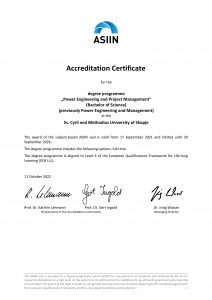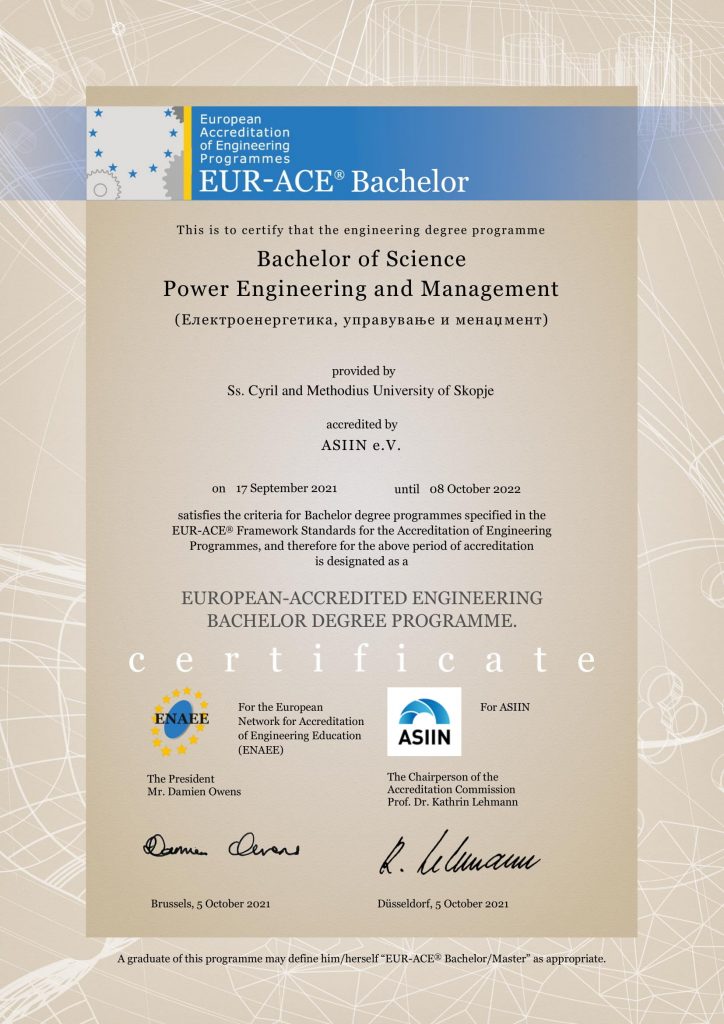ObjectivesLearning outcomesIIIIIIIVVVIVIIVIIIElective Courses
Study Programme
Power Engineering and Project Management
Degree Programme
First cycle degree programme
Level of qualification
Bachelor of Science in Electrical Engineering and Information Technologies, in Power Engineering and Project Management
Occupational Profiles of Graduates
Graduates from this study curriculum are capable to create their own business or to be emplyed in some of the companies that are dealing with: generating electricity by clasical or renewable sources; trading; power distribution and transmission companies; management, design, protection, automation and control of electric power facilities; consulting services in project management studies and techno-econimic analysis; energy efficiency and environment etc.
The Programme Learning Outcomes
Study programme Power engineering and Management follows the needs of the companies in power engineering area in order to create modern educated engineer that will have professional knowledge in power engineering, information and communication technologies, as well as, competence and knowledge for managing complex technical projects in a new market oriented business environment. In this study programme the students are studying technologies for power generation from clasical and renewable sources; substation and control systems in power systems; modern software tools for solving engineering tasks; methods for efficient usage of electricity, as well as, managerial skills and techniques of project management.
International Accreditation
The first cycle study programs at FEEIT are accredited by the German Accreditation Agency for Study Programmes in Engineering, Informatics, Natural Sciences and Mathematics (ASIIN), which is a world leader in quality assurance in higher education. This accreditation confirms that the study programs satisfies the criteria for Bachelor degree programs specified in EUR-ACE Framework standards for the accreditation of engineering programs and the content studied are relevant to areas covered in study programs.
General Learning Outcomes
| Knowledge and understanding |
- Demonstrate knowledge and understanding in the scientific field of electrical engineering, based on education and training, including knowledge of theoretical, practical, conceptual, comparative, and critical perspectives in the scientific field according to the appropriate methodology.
|
| Application of knowledge and understanding |
- Demonstrate the ability to apply acquired knowledge and understanding in a professional manner.
- An ability to identify, analyze and solve complex engineering problems by selecting an appropriate method.
|
| Ability to assess |
- An ability to collect, analyze, evaluate and present information, ideas, and concepts based on relevant data.
- Making an appropriate assessment taking into account personal, social, scientific and ethical aspects.
|
| Communication skills |
- An ability to communicate effectively in both verbal and written forms with professional and non-professional audiences.
- An ability to work effectively as an individual or as a member of a team taking shared responsibility for collective results.
- Ability to participate independently, in a professional manner, in regards to scientific and interdisciplinary discussions.
|
| Learning skills |
- Commitment to the professional development and lifelong learning achieved through higher education, technical training, membership in professional societies, and other activities in order to update already acquired knowledge in the relevant field to achieve continuous professional growth.
- An ability to acquire and apply new knowledge as needed using appropriate learning strategies.
|
Specific Learning Outcomes
| Knowledge and understanding |
- Demonstrate knowledge and understanding in the scientific field of electrical engineering, based on education and training, including knowledge of theoretical, practical, conceptual, comparative, and critical perspectives in the scientific field according to the appropriate methodology.
- Demonstrates knowledge and understanding of research, development, engineering design in industrial processes and power engineering and management.
- Understanding and knowledge of current issues related to scientific research and new sources of knowledge.
|
| Application of knowledge and understanding |
- An ability to identify, analyze and solve complex engineering problems.
- An ability to apply knowledge and understanding in a way that demonstrates professionalism to the relevant field or profession.
- An ability to identify, analyze and solve problems related to power engineering and management.
|
| Ability to assess |
- An ability to collect, analyze, evaluate and present information, ideas, and concepts from relevant data.
- Making an appropriate assessment taking into account personal, social, scientific and ethical aspects.
- An ability to provide answers to both theoretical and practical issues, in order to give explanations and choose the appropriate solution.
- An ability to analyze, evaluate and present information, ideas, and concepts based on relevant data in the field of power engineering and management of power plants.
|
| Communication skills |
- An ability to communicate effectively in both verbal and written forms with professional and non-professional audiences.
- An ability to work effectively as an individual or as a member of a team taking shared responsibility for collective results.
- An ability to participate independently and professionally in specific, scientific and interdisciplinary discussions.
|
| Learning skills |
- Commitment to professional development and lifelong learning through higher education, technical training, membership in professional societies, and other activities in order to update already acquired knowledge in the field and to achieve continuous professional growth.
- An ability to acquire and apply new knowledge as needed, using appropriate learning strategies.
- Demonstrate a high degree of independence initiative for learning and professional development.
- Understanding the need for learning and ability for continuous professional development, through the use of professional and scientific literature, professional training, continuing formal education, membership in professional organizations, etc.
- Awareness of new technologies and the ability to evaluate and use modern software development tools.
- An ability to use information technologies for distance and e-learning.
- Skills for cooperative, competitive and individual learning.
- Applying active teaching and learning techniques.
|
| During studying, the student may choose up to 4 courses from the faculty list of electives |
| During studying, the student may choose up to 4 courses from the faculty list of electives |
| During studying, the student may choose up to 4 courses from the faculty list of electives |
| During studying, the student may choose up to 4 courses from the faculty list of electives |
| During studying, the student may choose up to 4 courses from the faculty list of electives |
| During studying, the student may choose up to 4 courses from the faculty list of electives |





